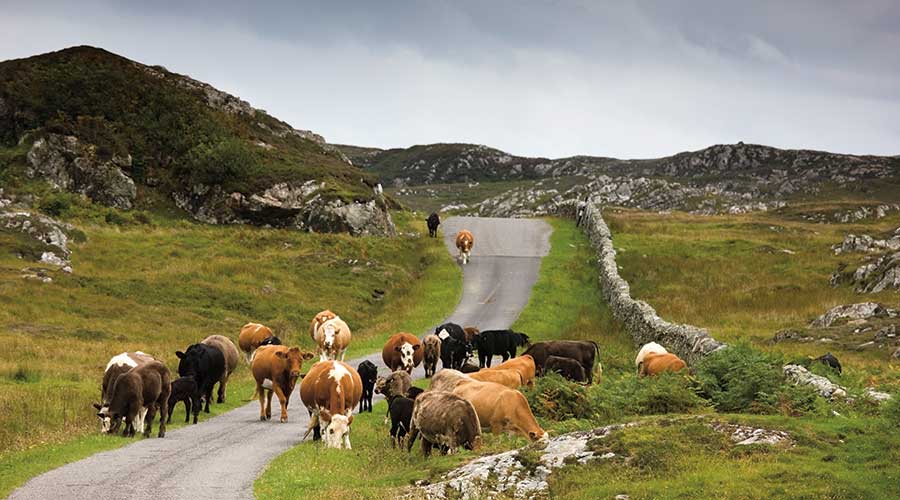Scots farmers face heavy losses from Brexit – SRUC
 © Design Pics Inc/Rex/Shutterstock
© Design Pics Inc/Rex/Shutterstock Changes in market prices and agricultural policy are predicted to have a major effect on the structure and resilience of Scottish agriculture after Brexit, according to a new independent report.
Scotland’s Rural College (SRUC) has analysed the potential economic implications of three post-Brexit trade scenarios on four farm types – beef, sheep, dairy and crops.
See also: AHDB post-Brexit scenarios analysed
As well as looking at the trade implications, the analysts have also considered the effect of removing the Basic Payment Scheme (BPS) under a new domestic agricultural policy, while retaining agri-environment scheme payments.
Three Brexit scenarios
- “Free-trade” deal with the EU – UK and EU retain tariffs- and quota-free access to each other’s market, UK maintains EU tariffs to the rest of the world, 5% trade facilitation costs
- “Fortress UK” – Existing EU tariffs adopted by the UK, WTO tariffs applied to imports and exports to the EU and to rest of the world, 8% trade facilitation costs
- “Trade liberalisation” – Zero tariffs on UK imports, most-favoured nation tariffs on UK exports, 8% trade facilitation costs
They found that, in every scenario, Scotland’s farmers would be worse off compared with the current trade arrangement, with some or all producers facing lower returns.
Price effect
Looking at prices in isolation, it was apparent that a free-trade agreement with the EU would have little effect on prices compared with what is expected to happen if the UK stayed in the EU.
Price implications of three scenarios (2015-2022) |
||||
| Baseline | Free-trade | WTO default | Unilateral trade liberalisation | |
| Beef | 6% | 6% | 29% | -39% |
| Sheep | 7% | 7% | -22% | -20% |
| Dairy | 6% | 7% | 37% | -2% |
| Wheat | 20% | 20% | 17% | 17% |
| Barley | 16% | 15% | 13% | 11% |
Should the UK adopt a more “fortress” approach after Brexit and apply WTO tariffs on all imports, beef and dairy would see substantial price increases due to import substitution, while sheep values would tumble.
But under a “trade liberalisation” scenario, all three of these sectors would see prices drop away.
The full effect of Brexit, however, can only be ascertained by looking at likely changes in the domestic support regime, and the SRUC report considers the effects of BPS removal.
This is predicted to lead to a substantial decrease in the viability of the Scottish beef and sheep sector, particularly when combined with any trade liberalisation.
For example, 89% of specialist sheep farms would be making losses in 2022 and the number of suckler cows in Scotland would be expected to fall by 28%.
Responses
Commenting on the report, Scotland’s rural economy secretary, Fergus Ewing, said: “This study confirms once again what the Scottish government has been saying all along – that the interests of farmers are best served by remaining within the EU.
“In all scenarios, failure to replicate the current trade arrangements with the EU will have a detrimental impact on farmers, with our sheep sector under particular threat.”
Steven Thomson, senior agricultural economist at SRUC, agreed that the results “highlight the potential threats” to the profitability of different Scottish farming sectors, especially hill farming.
However, he added there were also opportunities. And the researchers stressed the models only projected the possible effects of Brexit under specific changes and did not amount to predictions.
Key messages from SRUC report
- The “free trade” scenario has the least effect on all four farming systems studied.
- The “fortress UK” trade scenario would be financially beneficial for Scottish dairy and beef farmers, if the direct support payments remain (due to import substitution).
- The “trade liberalisation” scenario has a very substantial negative effect on Scottish farm profitability, especially for upland beef and sheep producers as tariff protection is lost.
- Even with existing levels of direct support and a “fortress UK” approach, Scotland’s ewe flock is expected to more than halve due to new tariff barriers for Scottish lamb entering the EU market and some shifting of production from sheep to cattle.
- The removal of direct support payments is predicted to lead to a substantial decrease in the viability of the Scottish beef and sheep sector, particularly under the trade liberalisation scenario. Under this scenario, 89% of specialist sheep farms are expected to make losses in 2022 and two-thirds of specialist beef producers.
- There is limited effect on the Scottish crop sector from these trade scenarios.
